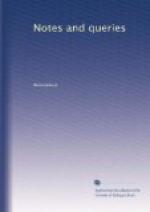Sir Joseph Jekyll, in the case of Barlow v. Bateman, in 1730, said,—
“I am satisfied the usage of passing Acts of Parliament for the taking upon one a surname is but modern, and that any one may take upon him what surname, and as many surnames, as he pleases, without an Act of Parliament.” (3 Peere Williams, 65.)
The decision of the Master of the Rolls in this case was afterwards overruled by the House of Lords; but on a point not affecting the accuracy of the observations I have quoted.
Lord Eldon, in the case of Leigh v. Leigh, decided in 1808, made the following remarks:—
“An Act of Parliament, giving a new name, does not take away the former name: a legacy given by that name might be taken. In most of the Acts of Parliament for this purpose there is a special proviso to prevent the loss of the former name. The King’s licence is nothing more than permission to take the name, and does not give it. A name, therefore, taken in that way is by voluntary assumption.” (15 Ves. Jun., p. 100.)
This case decided that the assumption of a name by a person, by the King’s license, would not entitle him to take under a limitation in a will “unto the first and nearest of my kindred, being male, and of my name and blood.” The same rule would no doubt hold as to a change of name by Act of Parliament. (See Pyot v. Pyot, 1 Ves. Sen. 335.)
These extracts from the highest authorities will sufficiently show of how little use is an Act of Parliament, or the royal license, for effecting a change of name; indeed, the chief, perhaps I might almost say the only, advantage of these costly forms, except, of course, where they are required by the express terms of a will, is the facility they afford in case it should become necessary to prove that John White was ten years ago John Brown.
Arun.
* * * * *
QUERIES ANSWERED, NO. 6.
There is no class of books which it more behoves future compilers of glossaries to consult, than those which treat of geography, navigation, military and naval economy, and the science of warfare both on shore and afloat. As far as the technical terms have been used by poets and dramatists, much valuable illustration may be found in the annotated editions of their works, but much more is required for general purposes, and I could point out some fifty volumes which would enable an industrious student, possessing a competent acquaintance with those subjects in their modern state, to produce a most useful supplement to our existing glossaries.
With very small pretensions to the amount of information which [Greek: S] ascribes to me, I will at once answer his query on the meaning of grummett.
GRUMETE is pure Spanish. It also occurs as a Portuguese word. I shall transcribe the explanations of it as given by the best authorities on those languages:—




